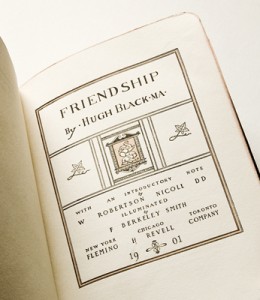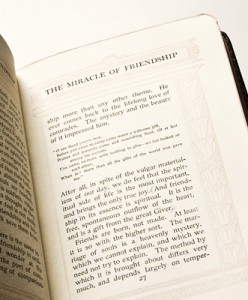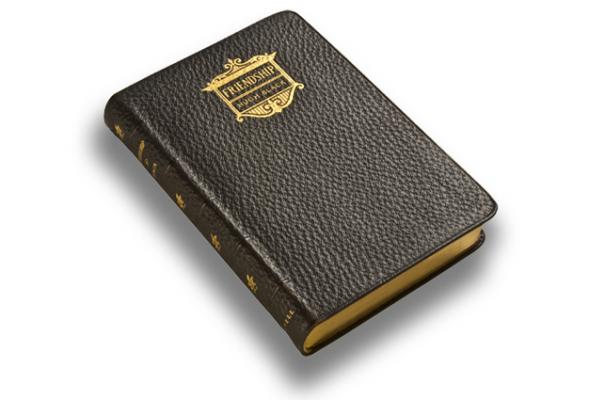Mary Baker Eddy’s copy of Friendship by Hugh Black (1868-1953), B00127
Mary Baker Eddy was an avid reader, and in fact it was this love of reading that her father linked to her frail health. In Retrospection and Introspection, Eddy writes, “My father was taught to believe that my brain was too large for my body and so kept me much out of school, but I gained book-knowledge with far less labor than is usually requisite.”1 This love of reading persisted throughout her life. It was in reading the Bible that she found healing as she lay in critical condition after a fall on an icy sidewalk in 1866. Throughout her long life, she also read many philosophers, thinkers, scientists and other religious leaders and writers of the day. One of the books found in Eddy’s personal library at the time of her passing in 1910 was Friendship by Hugh Black (1868-1953), a Scottish minister and theological professor at the turn of the twentieth century.
 The Reverend Dr. Hugh Black was born in Rothsay, Scotland. He graduated from Glasgow University in 1887, receiving a degree of M.A. Later that fall, he entered Free Church College in Glasgow. His early ministry was in Paisley at the Sherwood Free Church and he was ordained in 1891. In five years’ time, he was so impressive a force in the pulpit that he received several offers to preach at other churches. He left Paisley to join the St. George’s Free Presbyterian Church in Edinburgh. According to Mary Baker Eddy Mentioned Them, he was “the youngest man ever to be appointed to such a post in Scotland, [and] he was the most popular preacher of his day.”2 In 1905, Black was invited to Union Theological Seminary in New York to deliver a course of lectures on the art of preaching. The course was so well-received that a movement was begun to get Black to accept a permanent professorship of practical theology at the Seminary. He did so, and in 1906 he immigrated to the United States. Within five years he had also accepted the Pastorate of the First Congregational Church in Montclair, New Jersey, considered at that time (at least by the Coit Lyceum Bureau in Cleveland, Ohio, who promoted Black’s yearly lecture circuit) to be one of the most influential churches in the United States.
The Reverend Dr. Hugh Black was born in Rothsay, Scotland. He graduated from Glasgow University in 1887, receiving a degree of M.A. Later that fall, he entered Free Church College in Glasgow. His early ministry was in Paisley at the Sherwood Free Church and he was ordained in 1891. In five years’ time, he was so impressive a force in the pulpit that he received several offers to preach at other churches. He left Paisley to join the St. George’s Free Presbyterian Church in Edinburgh. According to Mary Baker Eddy Mentioned Them, he was “the youngest man ever to be appointed to such a post in Scotland, [and] he was the most popular preacher of his day.”2 In 1905, Black was invited to Union Theological Seminary in New York to deliver a course of lectures on the art of preaching. The course was so well-received that a movement was begun to get Black to accept a permanent professorship of practical theology at the Seminary. He did so, and in 1906 he immigrated to the United States. Within five years he had also accepted the Pastorate of the First Congregational Church in Montclair, New Jersey, considered at that time (at least by the Coit Lyceum Bureau in Cleveland, Ohio, who promoted Black’s yearly lecture circuit) to be one of the most influential churches in the United States.
He published many compilations of sermons and wrote six books, including Friendship in 1898, of which the rare book collection in Lending and Reference Services has a copy. Eddy’s personal edition dates from 1901, but we don’t know when she received this copy. Lyman P. Powell, who was a minister himself, notes in his book, Mary Baker Eddy: A Life Size Portrait (originally published in 1930):
…the author is not surprised to find her little blue pencil underlining the words: “…friendship in its essence is spiritual. It is the free, spontaneous outflow of the heart, and is a gift from the great Giver.”3
 Though an inspection of Eddy’s copy does not reveal the underlining that Powell describes, the lines are bracketed by neat blue parentheses, as are quite a few other passages in the book. It is clear from these markings that Eddy did read this book and found quite a lot that she felt was important or noteworthy.
Though an inspection of Eddy’s copy does not reveal the underlining that Powell describes, the lines are bracketed by neat blue parentheses, as are quite a few other passages in the book. It is clear from these markings that Eddy did read this book and found quite a lot that she felt was important or noteworthy.
Eddy also referenced Black in her Message to The Mother Church for 1902. This time, she paraphrased a line from his 1901 book, Culture and Restraint. Black writes, “It is religion man needs, not culture in itself. So the birthplace of modern civilization is not Athens, but Calvary.”4 Mary Baker Eddy’s line in her Message reads, “Rev. Hugh Black writes truly: ‘The birthplace of civilization is not Athens, but Calvary.’”5
Though he has been mostly lost to us today, Hugh Black was clearly an influential force of his time. His position at Union Theological Seminary was designed to take place during only the first half of the academic year, leaving the rest of the year for him to travel to churches, colleges, and to speak to those interested in the ministry. He gave addresses at Princeton, Mt. Holyoke, and Dartmouth, among others. He wrote editorials for the New York Times, and that paper frequently reported on his thoughts or where he was preaching. He caused some heated discussions about evolution, stating:
One thing is certain, that neither the world nor the Church gains from the theologian in a panic….We ought to believe in truth, and to be sure that only truth can permanently satisfy us. Experience assures us that the essential truths of religion cannot be shaken….6
One particular responder to that editorial felt that Black did not prop up theology and religion from such an onslaught as evolution, saying that Black revealed “…at least one thing of importance, namely, that modern theology has not one of its ancient legs left to stand on.”7
In the words of a 1906 article from The Outlook, a popular weekly magazine at the turn of the twentieth century,
Those who know Mr. Black find…a sincere, unaffected, and winning personality—loving to teach and therefore eager to learn, taking a personal interest in those with whom he associates, and expecting to receive as well as to give, with a strong sense of loyalty and personal obligation. He has hearty pleasure in human fellowship, is at home with all sorts of people, and shows a fine tact and courtesy in every situation. He is known to the public here as a writer as well as a preacher, and his books reveal the well-read and thoughtful man. All in all, it cannot be wondered at that he has crowded, “Free St. George’s” in Edinburgh to the doors and beyond.8
Unfortunately, Mary Baker Eddy and Black did not correspond with each other. But based on this description, it’s not surprising that Eddy, who was a preacher, teacher and lecturer herself, was drawn to his writings.
- Mary Baker Eddy, Retrospection and Introspection (Boston: The First Church of Christ, Scientist, 1901), 10.
- Mary Baker Eddy Mentioned Them (Boston: The Christian Science Publishing Society, 1961), 32.
- Lyman P. Powell, Mary Baker Eddy: A Life Size Portrait (Boston: The Christian Science Publishing Society, 1991), 310 .
- Hugh Black, Culture and Restraint (New York: Fleming H. Revell, 1901), 349-50.
- Eddy, Message to The Mother Church for 1902 (Boston: The First Church of Christ, Scientist, 1902), 10.
- The New York Times, September 22, 1912.
- Ibid., September 27, 1912.
- Francis Brown, “Hugh Black,” The Outlook, November 24, 1906, 744.


